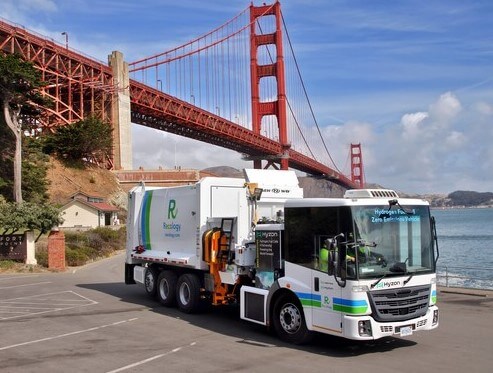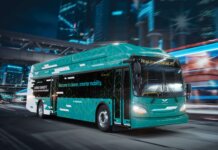Recology, a 100% employee-owned sustainable waste management company, will begin testing North America’s first hydrogen fuel cell-powered electric refuse collection vehicle — developed in partnership with New Way Trucks and Hyzon — in San Francisco this week.
The refuse collection vehicle was built in partnership between refuse truck body manufacturer New Way Trucks, and fuel cell manufacturer and technology developer Hyzon. Recology will be the first waste and recycling company to pilot this hydrogen fuel cell-powered electric refuse vehicle in the U.S., and San Francisco will be the first city in North America to test it on urban streets.
“In our quest to help protect the environment and address climate change, San Francisco is once again leading the nation in testing new approaches and equipment,” says Salvatore M. Coniglio, Recology’s CEO. “Recology’s leadership on recycling and composting helped make San Francisco ‘the greenest big city in the nation’; now we are leading the way on sustainable operations.”
Recology has long emphasized fleet sustainability. In 2019, the company put into service the nation’s first electric Class 8 rear loader in Seattle. Since then, Recology has tested electric collection vehicles throughout its operations and has prioritized the use of renewable or alternative fuels in its fleet. The company’s emissions from fuel use have been reduced by more than 77% since 2018.
Given the number of waste collection trucks on the nation’s roadways on any given day, the transition to zero-emission vehicles is a critical element of the U.S.’s strategy to address climate change and reduce greenhouse gas emissions.
“Considering there are more than 140,000 refuse trucks operating across the market today, waste collection presents an ideal application to showcase the viability of hydrogen fuel cell technology across the environmental services industry,” says Eric Evans, chief product officer for New Way.
Recology leaders got an early look at the new technology late in 2023, and New Way and Hyzon debuted the hydrogen fuel cell-powered electric refuse vehicle at Waste Expo in Las Vegas in May. New Way’s expertise in refuse collection and Hyzon’s focus on providing zero-emission, high-performance fuel cell systems to decarbonize demanding industries promise to make electric refuse collection a reality for the North American waste and recycling industry.
The first-of-its-kind refuse truck will be put to the test on routes in San Francisco, with Recology’s employee-owners at the wheel, over the next two weeks. After piloting this truck in San Francisco, Recology will test it in other Bay Area cities. New Way and Hyzon have scheduled additional trials throughout California later in 2024, to be followed by more trials in Canada.
“Our Hyzon high-performance hydrogen fuel cell systems offer the right technology to provide zero-emission power tough enough to perform the hard work a refuse truck needs to deliver, day in and day out,” adds Hyzon CEO Parker Meeks. “The interest will only increase, and I am excited for our continued partnership with New Way, and service providers like Recology, to change the future and power a better way forward.”
Recology’s trials with New Way and Hyzon will build on the success of Hyzon’s electric refuse collection vehicle trials in Australia, which have demonstrated that hydrogen fuel cell technology is a viable replacement for traditional heavy duty diesel engines. All three companies look to show that the New Way-Hyzon hydrogen fuel-cell refuse collection vehicle is overcoming some inherent challenges identified with other zero-emission technologies, such as range issues, fluctuations in operating temperatures and payload limitations.
To further prove hydrogen fuel cells as a more sustainable option in the refuse industry, Hyzon in July launched its Class 8 200-kW FCEV tractor-trailer trial program, which Recology also plans to trial.
Hyzon’s high-performance hydrogen fuel cell systems have been shown to provide consistent power over an expected range of at least 125 miles, including at least 1,200 cart lifts, along with trips to transfer stations.






